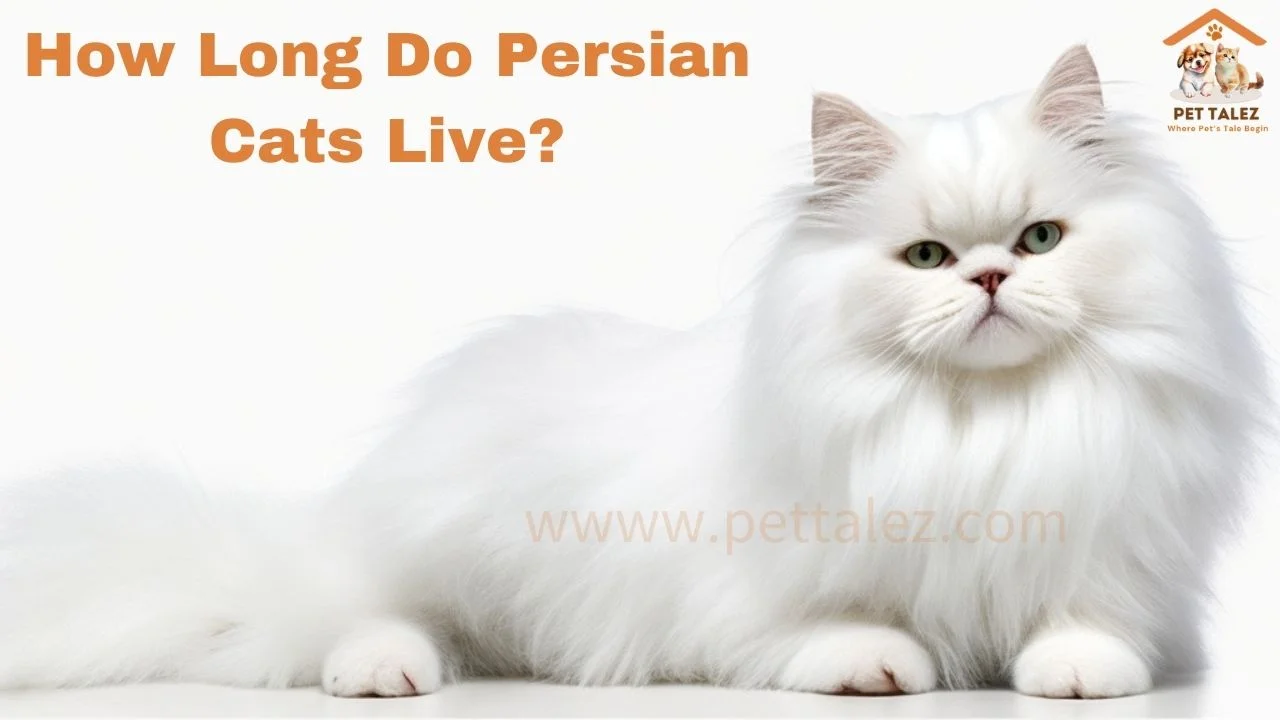Persian cats have long fur and friendly personalities. People love them. If you want one, you should know how long do Persian cats live and how to keep cats healthy. In this article, we will explore the factors that influence the longevity of Persian cats and provide you with valuable insights into their care.
Understanding the Persian Cat Breed
Persian cats are known for their distinct appearance with a round face, large eyes, and long, flowing coats. They have a rich history originating from Persia and have become beloved pets worldwide. Their gentle and affectionate nature makes them perfect companions, but their unique characteristics require specific care. Regular grooming, attention to potential health issues, and a calm living environment are vital to ensuring their well-being and a long, happy life.
How Long Do Persian Cats Live? Average Persian Cats Lifespan
Persian cats, with their distinctive long, silky fur and gentle temperament, have earned a special place in the hearts of cat enthusiasts. One of the questions most frequently asked by those considering adopting or buying a Persian cat is, “How long do they live?” The answer is heartening and reassuring: Persian cats typically live between 12 and 16 years old. This remarkable longevity sets them apart from numerous feline breeds, making them cherished, enduring companions for those who welcome them into their homes.
Factors Influencing the Longevity of Persian Cats:
Understanding the factors contributing to a Persian cat’s extended lifespan is crucial for providing the best care. Several vital elements come into play:
Genetics and Lifespan
One of the primary factors influencing Persian cats’ longevity is their genetics. These Persian cats are prone to specific hereditary health issues affecting their lifespan. For example, Persian cats are generally known to be predisposed to kidney disease and respiratory problems. Responsible breeding cat practices can help mitigate these risks.
Diet and Nutrition
Proper nutrition is essential for any pet’s well-being; Persian cats are no exception. High-quality cat food that meets their dietary needs is crucial for maintaining your Persian cat’s health. Obesity is common among Persian cats, so monitoring their weight and feeding them appropriately is vital to avoid related health problems.
Grooming and Coat Care
Persian cats are famous for their luxurious long coats, but this beauty requires regular grooming. Neglecting their fur can lead to matting and skin problems. Regular brushing and occasional professional grooming are essential to keep your Persian cat’s coat in top condition.
Dental Care
Oral hygiene of cats is often overlooked but significantly affects a cat’s overall health. Dental issues can lead to various health problems, impacting their longevity. Regular dental check-ups and teeth cleaning are essential for your Persian cat’s well-being.
Exercise and Mental Stimulation
Physical activity and mental stimulation are vital for a Persian cat’s happiness and longevity. While they may not be as active as other breeds, providing them with toys, playtime, and interaction can keep your cat mentally and physically fit.
In conclusion, the average lifespan of a Persian cat is a testament to their resilience and adaptability. By understanding and addressing the factors that influence their longevity, such as genetics, diet, grooming, and dental care, and providing a loving and low-stress environment, you can ensure that your Persian cat enjoys a long, fulfilling life as a cherished family member.
Common Health Issues in Persian Cats
Persian cats, with their distinctive appearance and gentle temperament, are prone to specific health concerns due to their breed characteristics. Here are some of the common health issues that Persian cat owners should be aware of:
Brachycephalic Syndrome:
Persian cats have flat, round faces, which can lead to brachycephalic syndrome. This condition may result in respiratory difficulties, snoring, and an increased risk of heat intolerance. Monitoring their breathing and ensuring they stay cool in warm weather is crucial.
Dental Problems:
Persians may be more susceptible to dental issues due to their brachycephalic facial structure. Periodontal disease, gingivitis, and tooth decay can occur if dental care is neglected. Regular dental check-ups and tooth brushing can help prevent these problems.
Kidney Disease:
Persian cats are genetically predisposed to kidney disease, which develops as they age. Kidney disease can be managed with a kidney-friendly diet and regular veterinary monitoring.
Eye Conditions:
Persians often experience eye problems, such as tear staining, entropion (eyelid rolling inward), and cherry eye. Proper eye care, including regular cleaning, can help address these problems.
Obesity:
Persian cats tend to gain weight, leading to various health complications, including diabetes and joint problems. Maintaining a healthy diet and encouraging exercise is essential to prevent obesity.
Allergies:
Some Persian cats may develop allergies, manifesting as skin issues, itching, or gastrointestinal problems. Identifying and addressing the allergens can help alleviate their discomfort.
Urinary Tract Issues:
Persians can be prone to urinary tract problems, blockages, and bladder infections. Adequate hydration and a diet that supports urinary health are essential preventive measures.
Heart Disease:
Hypertrophic cardiomyopathy (HCM) is a common heart condition in cats, including Persians. Taking your cat to the vet for veterinary exams can aid in the early detection and treatment of heart conditions.
Skin and Coat Problems:
Persians have long, luxurious coats that require daily grooming to prevent matting and skin issues. Neglecting grooming can lead to skin infections and discomfort.
Respiratory Infections:
Persian cats are susceptible to upper respiratory infections due to their facial structure. Keeping their living environment clean and providing good ventilation can help reduce the risk.
Awareness of these common health issues is vital for Persian cat breeder to provide proper care and ensure a happy, healthy life for their feline companions. Regular veterinary check-ups and preventive measures are essential in managing and addressing these breed-specific health concerns.
Giving Your Persian the Best Life
Persian cats are more than just pets; they become beloved members of our families. To ensure that your Persian enjoys the best possible life, it’s essential to consider various factors that contribute to their overall well-being. Here’s how you can provide your Persian with a beautiful and fulfilling life:
Love and Companionship:
Persian cats thrive on affection and companionship. Spend quality time with your feline friend, offering gentle petting and engaging playtime. The bond you build will be rewarding for both you and your cat.
Healthy Diet:
Provide your Persian with high-quality cat food to meet their specific nutritional needs. Avoid overfeeding, as obesity is a common issue among this Persian breed. Monitor their weight and adjust their diet to keep your Persian cat healthy physique.
Regular Grooming:
Persian cats are renowned for having long, plush coats. Regular grooming is essential to prevent matting and skin issues. Daily brushing and occasional professional grooming will keep their coat in pristine condition.
Dental Care:
Oral hygiene is often overlooked but is vital to a cat’s overall health. Brush your Persian cat’s teeth regularly and schedule dental check-ups to prevent dental issues.
Exercise and Stimulation:
Even though Persians are not the most active breed, they still need physical activity and mental stimulation. Please provide them with toys and interactive play to engage their minds and bodies.
Safe Environment:
Create a safe environment that minimizes potential hazards. Keep poisonous plants, substances, and tiny items out of the way. Ensure that windows and balconies are secure to prevent accidents.
Routine Veterinary Care:
Regular vet visits are crucial for vaccinations, check-ups, and preventive care. Your veterinarian can address any health concerns promptly, contributing to living a longer and healthier life.
Stress Reduction:
Persian cats are sensitive to stress. Minimize changes in their routine and provide a peaceful retreat for relaxation. Reducing stressors can significantly impact their happiness and longevity.
Socialization:
Expose your Persian cat to various people and experiences to build their social skills and confidence. Positive social interactions contribute to their overall well-being.
Love and Attention:
Finally, shower your Persian cat with love and attention. These gentle and affectionate cats thrive on an emotional connection with their human companions.
In conclusion, giving your Persian cat the best life involves a combination of love, proper care, a safe environment, and regular veterinary attention. By prioritizing their well-being and happiness, you can ensure that your Persian cat enjoys a fulfilling and content life as a cherished member of your family.
Conclusion
In conclusion, Persian cats have the potential for a long and happy life, provided they receive proper care and attention. Their genetics, diet, grooming, dental care, and overall environment are crucial in determining their lifespan. By following these guidelines and ensuring a loving and stress-free environment, you can enjoy the companionship of your Persian cat for many years to come.
FAQs (Frequently Asked Questions)
Q1: How can I ensure my Persian cat lives a long life?
A1: To ensure your Persian cat's longevity, focus on their genetics, diet, grooming, dental care, and providing a loving environment with minimal stress.
Q2: What is the most common health issue in Persian cats?
A2: Kidney disease and respiratory issues are common health concerns in Persian cats due to their genetic predisposition.
Q3: How often should I groom my Persian cat?
A3: Regular grooming, including daily brushing and occasional professional grooming, is essential to maintain their beautiful coat.
Q4: Do Persian cats require a special diet?
A4: Persian cats benefit from high-quality cat food that meets their specific dietary needs, helping to prevent obesity and related health problems.
Q5: What signs should I look for to detect health issues early?
A5: Watch for changes in behavior, appetite, or appearance in your Persian cat, and consult a veterinarian if you notice any unusual signs.

